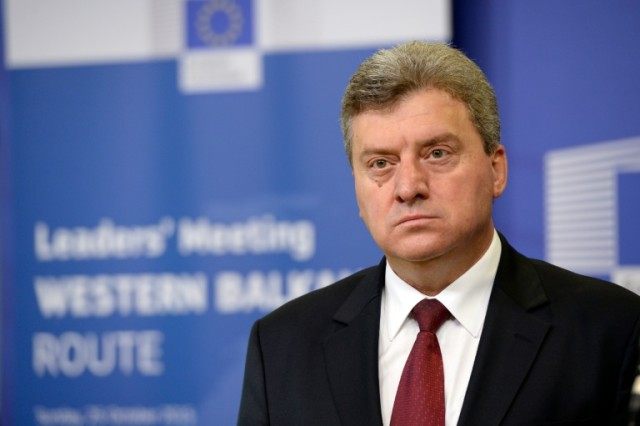Skopje (AFP) – Macedonia was mired in fresh political turmoil Wednesday after the president blocked judicial proceedings against top politicians embroiled in a wire-tapping scandal, sending opposition protesters back onto the streets in a crisis that is threatening the country’s EU aspirations.
The United States and European Union both voiced “serious concerns” about the move by President Gjorge Ivanov, which drew hundreds of demonstrators onto the streets of Skopje on Tuesday evening.
The Balkan country is also on the frontline of the migrant crisis, with its actions blocking people from crossing into Macedonia leading to a row with neighbouring Greece.
In a televised address to the nation on Tuesday, Ivanov said he was bringing the legal proceedings to a halt “in order to put an end to this political crisis, which will end with democratic elections”.
Last year the opposition Social Democratic Union of Macedonia (SDSM) accused then prime minister Nikola Gruevski of wiretapping around 20,000 people including politicians and journalists, and said the recordings revealed high-level corruption.
The government denied the accusations and in return filed charges against SDSM leader Zoran Zaev, accusing him of “spying” and attempts to “destabilise” the poor Balkan country, which is hoping to join the EU.
– ‘Coup d’etat’ –
Gruevski was among those being targeted in the probes, along with Zaev, former interior minister Gordana Jankulovska and ex-intelligence chief Sasho Mijalkov.
A political ally of the president, Gruevski stepped down as premier in January to open the way for parliamentary elections in June — but the opposition wants to boycott them.
Although he may himself benefit from the amnesty, Zaev denounced what he called a “coup d’etat” by “the man put in place by Nikola Gruevski”.
The pardon immediately raised tensions on the streets as hundreds of protesters staged demonstrations, some of them pelting Ivanov’s party HQ with eggs.
Further protests were possible later Wednesday, with law professor Ljubomir Frckoski, who is close to the SDSM, saying on television that “citizen marches could be the solution”.
Macedonia has been a candidate for EU membership since 2005 but accession talks have yet to open and the prolonged crisis will do nothing to improve its chances.
– Concerns about rule of law –
The bloc’s foreign policy arm voiced alarm, saying Ivanov’s amnesty raised “serious concerns”.
“We call on all sides to avoid interventions that risk undermining years of efforts within the country and with the support of the international community to strengthen the rule of law,” it said in a statement.
EU Enlargement Commissioner Johannes Hahn said on Twitter that Ivanov’s decision was “not in line with my understanding of the rule of law”.
The US embassy said it was seeking clarification of Ivanov’s move, but warned that it “raises serious concerns about Macedonia’s commitment to the rule of law”.
Highlighting Macedonia’s importance as a frontline state in Europe’s migrant crisis, Ivanov was visiting the frontier with Greece on Wednesday, as fresh clashes broke out between migrants and police.
Violence erupted at the weekend when hundreds of migrants tried to storm the razor-wire fence sealing the border as part of efforts to stop the flow of people from Greece to wealthy northern Europe.
Ivanov’s move appeared to take even his own VMRO-DPMNE party by surprise. It said it was “shocked” by the president’s decision.
“We have no doubt in his honest and good intentions… but we want to express our huge disagreement with his move,” it said in a statement.
The original wire-tapping scandal triggered rival protests on the streets of Skopje and eventually prompted the EU to step in and mediate.
All political parties eventually agreed to solve the crisis at elections scheduled initially for April 24 but then postponed to June 5 following concerns among the opposition and international community they would not be free or fair.
In light of the latest developments, Hahn tweeted: “I have serious doubts if credible elections are still possible.”
Earlier this month Zaev’s party said it would boycott the polls, fearing they would be open to fraud. The SDSM has also boycotted parliament since the 2014 election, which it said was fraudulent.

COMMENTS
Please let us know if you're having issues with commenting.